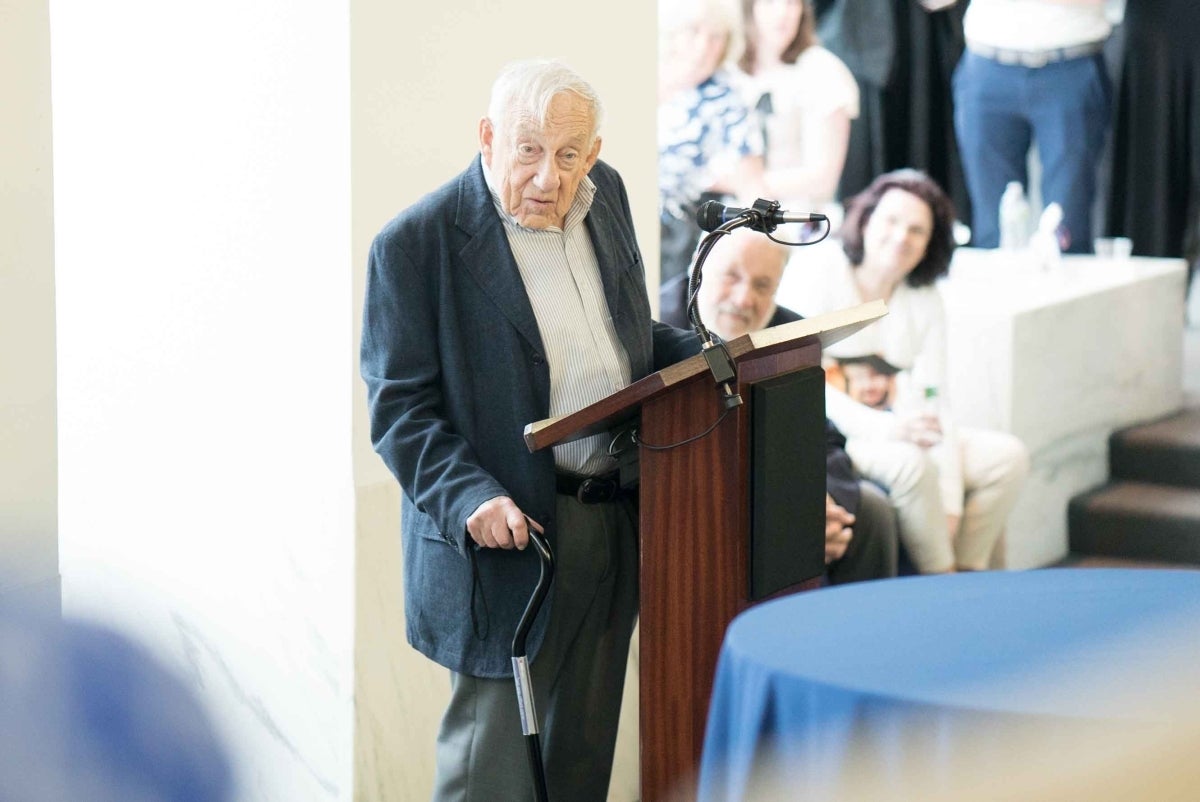Our Memories of Elihu Katz
With loving tributes, the Annenberg community shares its memories of Elihu Katz and the academic and personal lessons he taught us.
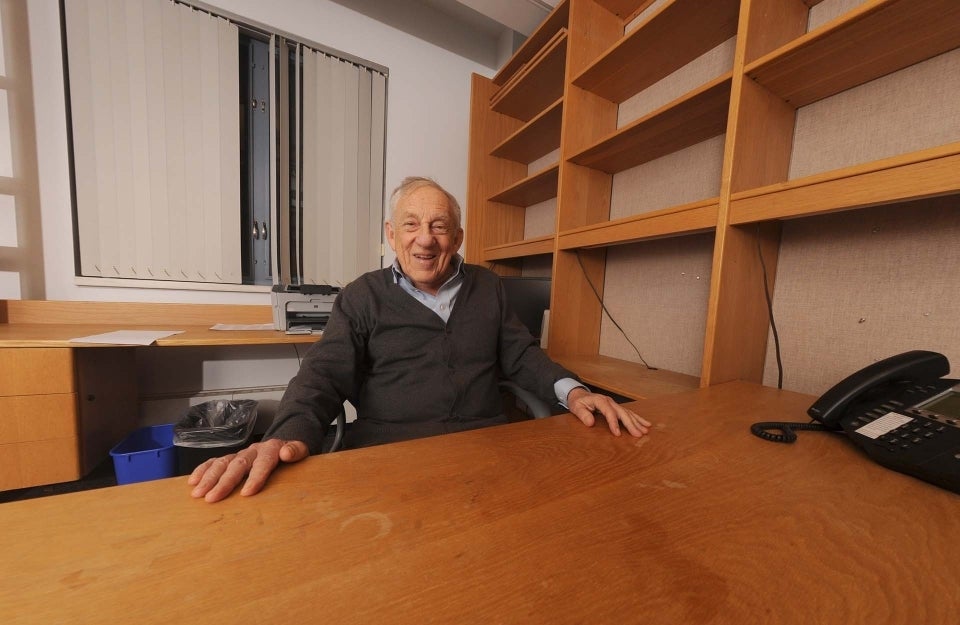
Distinguished Trustee Emeritus Professor of Communication Elihu Katz, one of the founding figures in the field of Communication and a pioneer of Israeli television, passed away at the end of 2021. We asked members of our community to share some of the lessons they learned from Dr. Katz We heard from Professor Michael X. Delli Carpini, and below we are pleased to share tributes from just a sampling of the many people whose lives Dr. Katz impacted. They are beautiful and touching memories, full of Dr. Katz's warmth and wisdom. If you would like to share more, please email them to news@asc.upenn.edu.
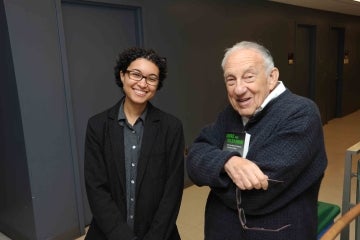
Dr. Elihu Katz taught me the importance of personal influence and cafe conversations — both in theory and in practice. I am grateful for his generosity and that I had the opportunity to learn about communication, canon, and (unexpectedly) my personal family history from someone who was a living legend.
Cabral Bigman (Ph.D. ‘11)
Associate Professor
University of Illinois at Urbana-Champaign
To this day I keep a jar of candy on my desk because of Elihu Katz. As a graduate student at Annenberg, I suffered from all the usual anxieties, imposter syndrome, plus some extras because of my age, parenting status, and former career. So when I had an appointment to meet with Dr. Katz to discuss my research ideas, I was thoroughly intimidated. Chest-pounding nervousness.
As we started to talk, I noticed him closing his eyes as he listened — which I found reassuring. He was really listening to me! And then he sat up, interrupted me, and reached for a bowl of candy. "Would you like a sweet?" he asked. In a moment, my anxieties fell away. It was such a perfect moment of human connection, because he took a piece of candy too. Maya Angelou's observation that people will always remember the way you make them feel? I've never forgotten Elihu Katz making me feel welcome. For all his incredible intellectual accomplishments, I hope he is also, always remembered for his gentle spirit.
Mary Angela Bock (Ph.D. ‘09)
Associate Professor
The University of Texas at Austin School of Journalism and Media
I learned more from Elihu Katz that I can summarize in an email, but probably the most important thing was the call to be intellectually ambitious. This might have been because his own work as a young scholar (and then throughout his career) ended up being so important to the field. He really didn't care for modest efforts. He wanted you to push yourself, always.
Mark Brewin (Ph.D. ‘02)
Chapman Associate Professor of Media Studies
University of Tulsa
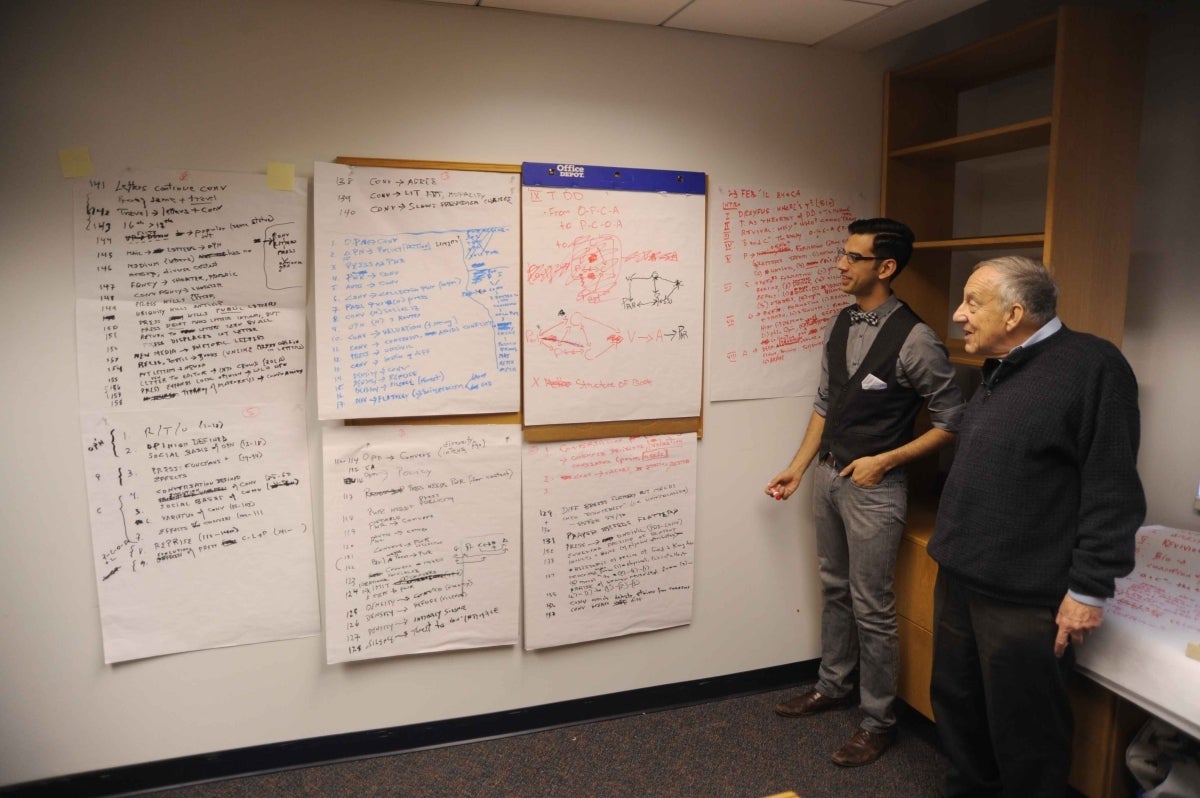
Professor Katz was an inspiration to me in several ways. Maybe the most notable was that I always saw him as a thinker of communication processes, as a scholar building theory based on sound logic and well-established empirical data, and I wanted to emulate that. I remember that my feelings for social network analysis, persuasion and personal influence got all connected during his classes, especially those sessions about diffusion. An inspiration indeed.
Peter Busse (Ph.D. ‘11)
Associate Professor
Universidad de Lima
There is so much to say about Elihu Katz, all of it complimentary. He was all that being a colleague was supposed to be. But that picture used to mark his passing, pretty much about says everything about what he meant to me. While that picture might have been posed, it seems so obvious that he is LISTENING to what was being said to him. That is a much valued, and quite rare behavior for someone who knows as much and who has done as much as he has. But I never doubted for an instant when I was speaking with him, even in those rare instances when we didn’t quite see things in quite the same way, that he gave me his attention with unconstrained generosity. I loved and respected him for that!
Oscar H. Gandy, Jr.
Professor Emeritus of Communication
Annenberg School for Communication
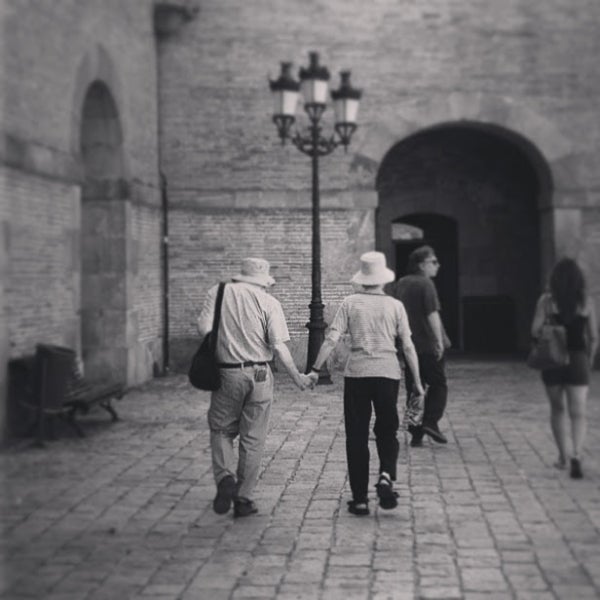
The main thing I learned from Elihu Katz is that there are no ideas, big or small, unworthy of deep curiosity. Through his writings, Elihu wove a rich tapestry of knowledge from which so many of us will draw for years to come – luckily, since each of the threads we pick as we read lengthens the luxury of his company, allowing the conversation to go on, and his voice to reverberate through our own work and writing.
But above the wisdom was always the genius, the brilliance that turned even the most casual conversations into precious moments. I remember walking the streets of Barcelona, my home city, with Elihu and Ruth, and the rest of the SummerCulture contingent led by Barbie [Zelizer]. Elihu’s eyes added a whole new layer to a city I thought I knew best. Even the simple act of moving from place A to place B became a little intellectual journey when done in his company. The weight of Elihu’s ideas was proportional to the weight of his humanity, and seeing him carry that weight with such humility is, to my mind, the biggest lesson of all.
Sandra González-Bailón
Associate Professor of Communication
Annenberg School for Communication
Professor Elihu Katz had advised my master thesis (1994) and doctoral dissertation (1997). During my Anneberg days, my desk was in his office on the second floor, where the coffee machine was always on and the whiteboard kept some of Elihu's scribbles out of our brainstorming. He was always talking to someone either over the phone or face-to-face. Yes, he loved conversation.
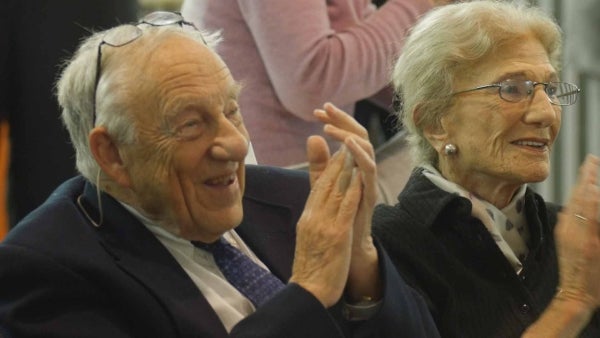
If I pick just one thing that I learned from him, that should be the primacy of conversation — whether political talk in deliberative democracy or interpersonal interactions as theorized in his two-step flow of communication. As his beloved student, I have been thinking that I should someday add one more step (self-talk) to his model, to make it three-step flow of communication. I believe self-talk is the irreducible essence of conversation.
Elihu's conversation always carried some sense of humor. At the end of every sentence he talks, you would find his lovely smile with warm eyes. When I visited his home in Jerusalem, he jokingly told me that I might be a Jew. "Jews are everywhere in the world," his wife Ruth added. Elihu was smiling with his warm eyes. Since then I think I became a Jew at least intellectually, even perhaps biologically. (He loved to use the word "perhaps.") He once invited me and my wife to a concert in Philly. Since then he has been my intellectual Father. Like every father to his son, he is my hero. I miss him.
Joohan Kim (Ph.D. ‘97)
Professor, Department of Communication
Yonsei University
I first met Dr. Elihu Katz through his prolific writings, which I studied and admired as a graduate student at Annenberg. After receiving my M.A. in 1977, I left for Israel with a letter of introduction to Professor Katz from his colleague and my adviser, Dr. Charles Wright. I can still remember visiting his office at the Hebrew University, newly arrived in Jerusalem and eager to meet the man whose pioneering work I had so respected.
Years passed and, some twenty years later, I was to meet Elihu again. This time, I was back at Annenberg to join the cohort of postdoctoral fellows he convened for a year of study devoted to “The Future of Fact.” As always, he was ever curious, always focused, more energetic than any of us in facing the important questions raised by our various scholarly projects.
From Elihu, I learned that the gifts of good health and a questioning mind are not to be taken for granted, for he never seemed tired nor weary of probing deeper and learning something new. That spirit has inspired many of us who had the privilege of seeing him at work, and at play. With gratitude for the privilege of having known Elihu Katz, I send my condolences to his dear family. I join with many others who would say: may his memory be for a blessing.
Hannah Kliger (Ph.D. ‘85)
Professor of Communication & Jewish Studies
Penn State University
To observe Elihu was to learn from him:
The generosity of defusing the high stakes of academic performance with a wry, perceptive joke about the proceedings.
The ability to listen deeply so as to synthesize the essence in an original way the speaker herself may not have seen.
Carolyn Marvin
Francis Yates Professor Emeritus of Communication
Annenberg School for Communication
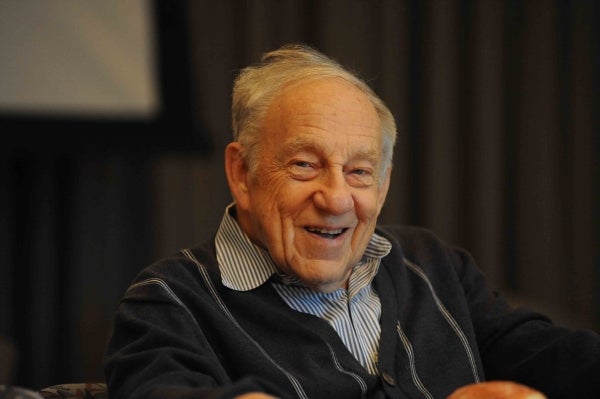
I will always be amazed and filled with gratitude that I had the great fortune to learn from Dr. Elihu Katz and to have had him serve as a member of my dissertation committee.
I will always remember Dr. Katz's class on Canonic Texts in Media Research. Dr. Katz had the kindest (yet mischievous) smile. I learned about two-step flow, diffusion, media events, uses and gratifications, the work of Gabriel Tarde, and so much more, from a legend and founder of the field of Communication. I think of Dr. Katz when I am teaching these theories and models to my own students, and incorporating them in my research.
With tremendous appreciation and fondness always,
Kimberly Meltzer (Ph.D. ‘07)
Associate Professor
Marymount University
Elihu taught me to take both a long view – to incorporate scholarly thinking from bygone communication eras may still be prescient and instructive today – and a broad view – to consider administrative, cultural, and critical perspectives to inspire research and debate – to understand the many roles that media and mediated technology play in our lives and in broader societies. His perspective and voice were one of a kind. I’m forever grateful to have had a chance to learn from him during my time at the Annenberg School.
Jeff Niederdeppe (Ph.D. ‘06)
Professor of Communication
Cornell University
I was deeply saddened to learn of the death of my dear professor Elihu Katz. Although he was not officially my adviser when I was doing my M.A. at Annenberg, he was the person I always turned to for advice and inspiration. He was unfailingly supportive, responsive and appreciative – while at the same time never letting me off the hook if I got lazy: I remember he gave me a B+ on one term paper, and when I questioned the low grade he said, “If it had been anyone else I probably would have given them an A-, but I know you could do better.” Touché!
I also had the enormous privilege of co-editing his book Canonic Texts in Media Research. What started as a standard RA assignment in my final semester turned into a two-year job in which I worked closely with the editors (Elihu, Tamar Liebes, and John Peters), communicated regularly with all the authors, copy-edited and proofread their content, and hand-indexed the whole book. In consequence, instead of just getting a standard thank-you in the acknowledgements, Elihu and the other editors promoted me to co-editor – a huge honour, and one that brings my colleagues fondly to mind each year when the royalty cheque comes in!
Elihu also showed us that academic writing can be charming and witty while still being thoroughly scholarly, which was a great delight to me after years of wading through unnecessarily turgid texts with rubber boots.
All in all, Elihu perfectly fit the description of “a gentleman and a scholar,” and I mourn his passing today. We have lost a giant.
May his memory be for a blessing. זכרונו לברכה.
Avril Orloff (M.A.C. ‘00)
Visual Facilitator
Outside the Lines Creative Facilitation
It was an incredible honor for me to have Elihu Katz as a colleague. To say that he was living history doesn’t capture the intellectual stimulation, warmth, and generosity he brought to any discussion. He was always a good listener and I cherish the memory of the many conversations I had with him about the history of communication studies and the ongoing tensions and collaborations between "administrative" and "critical" research, which helped me think through new ideas for my ongoing project on the intellectual history of the field. His legacy lives on and I look forward to continuing to engage with his important work.
Victor Pickard
C. Edwin Baker Professor of Media Policy and Political Economy
Annenberg School for Communication
Elihu Katz was one of the most influential and respected mentors I had the pleasure of working with at Annenberg. He was also hilarious. I loved his dry wit and wry humor, which he seamlessly peppered into conversations and Q&As, all while sharing his exceptional knowledge with the rest of us. He once told me that he was disappointed that falafel I ordered for a colloquium didn’t “taste like his mother’s recipe” – I reminded him that the food was from a place called The Philadelphia Catering Company and that they did their best…
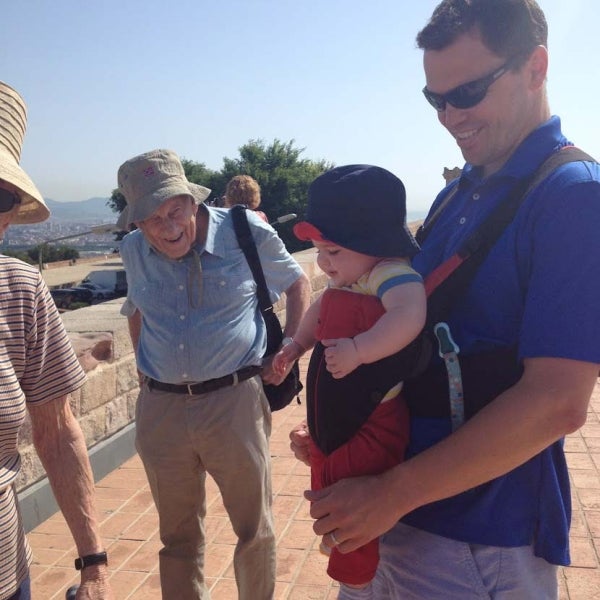
I had the pleasure of spending two weeks with Elihu in Barcelona during SummerCulture 2014, when Barbie Zelizer directed the Scholars Program in Culture and Communication. I was fortunate that my husband, John, and 9-month-old son, Darwin, were able to accompany us on the trip, both of whom were as enamored with Elihu as I was. Elihu commented that Darwin had a “big name to live up to” but could tell already that he was up to the challenge when he took his first steps while we were there. At the end of the trip, Elihu recited a poem he had written about his SummerCulture experience. It made us all reflect, laugh and smile. All of which I will always do when I think of Elihu.
Emily Plowman
Center Coordinator, Center for Media at Risk
Annenberg School for Communication
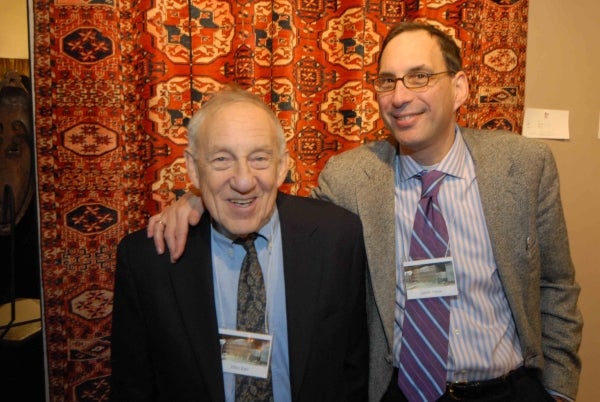
Elihu and I went to the same elementary and middle school. It seems quite clear to me that his engagement there and later with biblical, rabbinic, and, to a lesser extent, Talmudic studies enhanced his natural ability to connect the dots among issues and phenomena that stood out to him. To me, that was Elihu’s greatest talent, fed by insatiable curiosity, and he had it to the end.
Monroe Price wrote to Sandra González-Bailón that “ideas were romantic things and Elihu was a romantic.” I think that’s very observant. It seems to me that Elihu, ever curious, saw an almost aesthetic value in elegant intellectual frameworks and explanations.
Joseph Turow
Robert Lewis Shayon Professor of Media Systems & Industries
Annenberg School for Communication
I only got to meet Elihu in person a handful of times, but the most memorable occasion was the first. It was in 2003, when he emailed me out of the blue to tell me that my book “Six Degrees,” which he’d just read, had given short shrift to the Lazarsfeld era at Columbia, in particular the Bureau of Applied Social Research.
Network science has many roots, and it’s hard to do justice to them all in a single book, nor was I really trying to. Nonetheless, I was in the Sociology Department at Columbia at the time, right down the corridor from Lazarsfeld’s old office, so I conceded that he had a point.
We arranged to meet when he was up in New York next, and he came to my office with his wife Ruth. I was expecting to receive something of a dressing down, but they were both so gracious and generous that it ended up being a lot of fun, and led to more visits in both directions. Along the way, I learned more about the Bureau and came to share Elihu’s view that Lazarsfeld, while famous, had been under-appreciated historically.
Even more than that, I was inspired by the “Applied” part of the name. In a move that must have been out of left field at the time, and would be innovative even today, Lazarsfeld funded part of the Bureau’s research activities out of commercial work.
Perhaps the best example of this model was Elihu’s own Ph.D. research, published later as “Personal Influence,” which in my view is still the best work on the topic six decades later. Although its theoretical contributions are widely appreciated, less well known is that the empirical component was conducted as a paid consulting job for a magazine. That foundational science could be generated in the service of applied questions was an idea that I found very appealing and has influenced me ever since. It was an honor to interact with Elihu and I’m grateful that he took the time to educate me.
Duncan Watts
Stevens University and PIK Professor
University of Pennsylvania
"Be open-minded. During my days as a doctoral student, Professor Elihu Katz impressed me by his willingness to entertain pontifications from his students, embodying a life lesson also characteristic of my mother: there is always more to learn. Dr. Katz had a capacity to consider student arguments as new ideas. Then, in the light of his years of scholarship, he would put them in the perspective of an ongoing intellectual history, in a way that praised, rather than condemned the student. I strive to be so thoughtful (and well-read), and until then, to maintain an active curiosity about the world."
RIP Elihu Katz.
Ricardo J. Wray (Ph.D. ‘00)
Professor of Health Communication
Saint Louis University
Years ago, when my son Jason was in 1st grade, he had to do school homework. He complained how dreadful it was and said he'd rather watch movies.
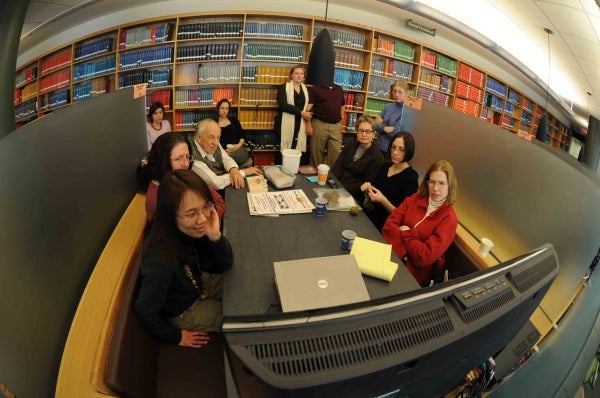
At that time, Professor Katz was teaching “COMM 396: Media Events," which was about how the live broadcasts of events such as Prince Charles and Diana's Wedding and Neil Armstrong’s moon landing interrupted the flow of daily life and amassed huge audiences to celebrate an “historic” occasion of social integration. His students had to watch lots of movies and documentaries.
So, to encourage Jason to study, I said one of the courses at my school was to watch lots of movies for homework. His face glowed in excitement like a flower and his eyes sparkled. He said "really? I want to take that course." I said in a straight face, hiding my giggling, "Well, you have to study hard now to make it to Penn. Then you can take it.”
When Dr. Katz visited Annenberg in 2018, he stopped by the library to thank me for helping him prepare his course materials. I remembered the story and asked when he would be back next time, wishing my son could meet him. He had this big smile on and held my hand tight, seemingly unwilling to let go.
In the fall of 2020, Jason did make it to Penn. Sadly, he never got a chance to take Professor Katz's course, or get to know his kindness, sense of humor in person. Still, I believe Dr. Katz already had profound personal influence on him.
Min Zhong
Library Services Assistant
Annenberg School for Communication
